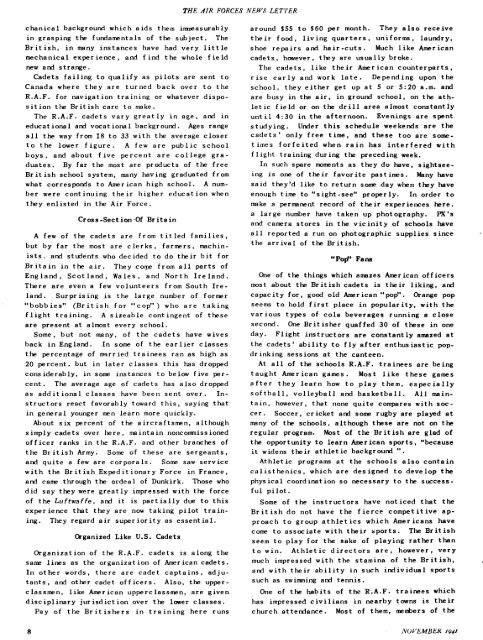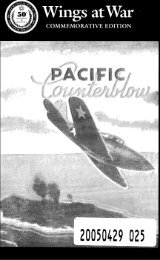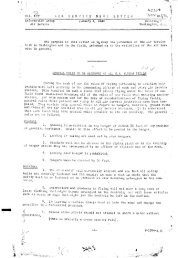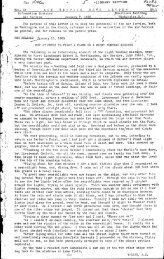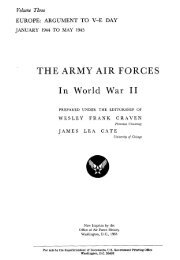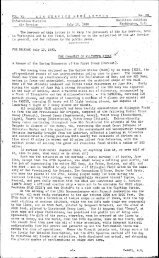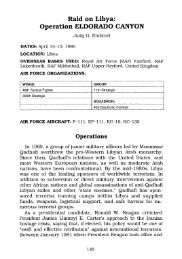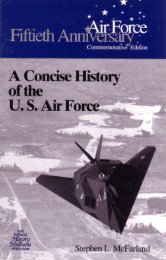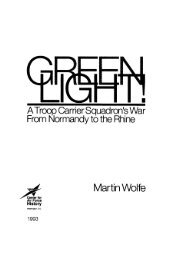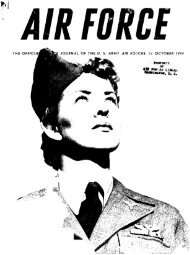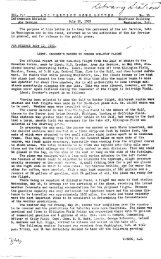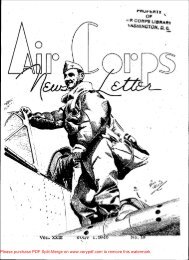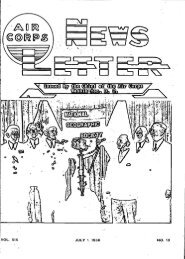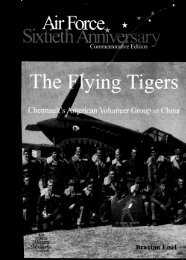News Letter 1941 Jul-Dec - Air Force Historical Studies Office
News Letter 1941 Jul-Dec - Air Force Historical Studies Office
News Letter 1941 Jul-Dec - Air Force Historical Studies Office
Create successful ePaper yourself
Turn your PDF publications into a flip-book with our unique Google optimized e-Paper software.
THE AIR FORCES NEWS LETTER<br />
chanical background which aids them inmeasurably<br />
in grasping the fundamentals of the subject. The<br />
British, in many instances have had very little<br />
mechanical experience, and find the whole field<br />
new and strange.<br />
Cadets failing to qualify as pilots are sent to<br />
Canada where they are turned back over to the<br />
R.A.F. for navigation training or whatever disposition<br />
the British care to make.<br />
The R.A.F. cadets vary greatly in age, and in<br />
educational and vocational background. Ages range<br />
all the way from 18 to 33 with the average closer<br />
to the lower figure. A few are public school<br />
boys, and about five percent are college graduates.<br />
By far the most are products of the free<br />
British school system, many having graduated from<br />
what corresponds to American high school. A number<br />
were continuing their higher education when<br />
they enlisted in the <strong>Air</strong> <strong>Force</strong>.<br />
Cross-Section'Of<br />
Britain<br />
A few of the cadets are from titled families,<br />
but by far the most are clerks, farmers, machinists.<br />
and students who decided to do their bit for<br />
Britain in the air. They co~e from all parts of<br />
England, Scotland, Wales, and North Ireland.<br />
There are even a few volunteers from South Ireland.<br />
Surprising is the large number of former<br />
"bobbies" (British for "cop") who are taking<br />
flight training. A sizeable contingent of these<br />
are present at almost every school.<br />
Some, but not many, of the cadets have wives<br />
back in England. In some of the earlier classes<br />
the percentage of ma rr Ied trainees ran as high as<br />
20 percent. but in later classes this has dropped<br />
considerably, in some instances to below five percent.<br />
The average age of cadets has also dropped<br />
as additional classes .have been sent over. Instructors<br />
react favorably toward this, saying that<br />
in general younger men learn more quickly.<br />
About six percent of the aircraftsmen, although<br />
simply cadets over here, maintain noncommissioned<br />
off icer ranks in the R.A.F. and other branches of<br />
the Br it ish Army. Some of these are sergeants,<br />
and quite a few are corporals. Some saw service<br />
with the British Expeditionary <strong>Force</strong> in France,<br />
and came through the ordeal of Dunkirk. Those who<br />
did say they were greatly impressed with the force<br />
of the Luftwaffe. and it is partially due to this<br />
experience that they are now taking pilot training.<br />
They regard air superiority as essential.<br />
Organized Like U.S. Cadets<br />
Organization of the R.A.F. cadets is along the<br />
same lines as the organizat ion of Amer ican cadets.<br />
In other words, there are cadet captains, adjutants,<br />
and other cadet officers. Also, the upperclassmen,<br />
like American upperclassmen, are given<br />
disciplinary jurisdiction over the lower classes.<br />
Pay of the Britishers in training here runs<br />
around $55 to $60 per month. They also receive<br />
their food, living quarters, uniforms, laundry,<br />
shoe repairs and hair -c ut s , Much like Amer ican<br />
cadets, however, they are usually broke.<br />
The cadets, like the ir Amer ican counterparts,<br />
rise early and work late. Depending upon the<br />
school, they either get up at 5 or 5: 20 a .rn. and<br />
are busy in the air, in ground school, on the ath.<br />
letic field or on the drill area almost constantly<br />
until 4:30 in the afternoon. Evenings are spent<br />
studying. Under this schedule weekends are the<br />
cadets' only free time, and these too are sometimes<br />
forfeited when rain has interfered with<br />
flight training during the preceding week.<br />
In such spare moments as they do have, sightseeing<br />
is one of their favorite pastimes. Many have<br />
said they'd like to return some day when they have<br />
enough time to "sight-see" properly. In order to<br />
make a permanent record of their experiences here.<br />
a large number have taken up photography. PX's<br />
and camera stores in the vicinity of schools have<br />
all reported a run on photographic supplies since<br />
the arrival of the British.<br />
"Poll' Fans<br />
One of the things which amazes American officers<br />
most about the British cadets is their liking, and<br />
capacity for, good old American "poP". Orange pop<br />
seems to hold first place in popularity, with the<br />
various types of cola beverages running a close<br />
second. One Britisher quaffed 30 of these in one<br />
day. Flight instructors are constantly amazed at<br />
the cadets' ability to fly after enthusiastic popdrinking<br />
sessions at the canteen.<br />
At all of the schools R.A.F. trainees are being<br />
taught American games. Most like these games<br />
after they learn how to play them, especially<br />
softball, volleyball and basketball. All maint<br />
ain j however, that none quite compares with soccer.<br />
Soccer, cricket and some rugby are played at<br />
many of the schools, although these are not on the<br />
regular program. Most of the British are glad of<br />
the opportunity to learn Amer ican sports, "because<br />
it widens their athletic background "",<br />
Athletic programs at the schools also contain<br />
calisthenics, which are designed to develop the<br />
physical coordination so necessary to the successful<br />
pilot.<br />
Some of the instructors have not iced that the<br />
British do not have the fierce competitive approach<br />
to group athletics which Americans have<br />
come to associate with their sports. The British<br />
seem to play for the sake of playing rather than<br />
to win. Athletic directors are, however, very<br />
much impressed with the stamina of the British,<br />
and with their ability in such individual sports<br />
such as swimming and tennis.<br />
One of the habits of the R.A.F. trainees which<br />
has impressed civilians in nearby towns is their<br />
church attendance. Most of them, me.mers of the<br />
8<br />
NUVEMBER /94/


